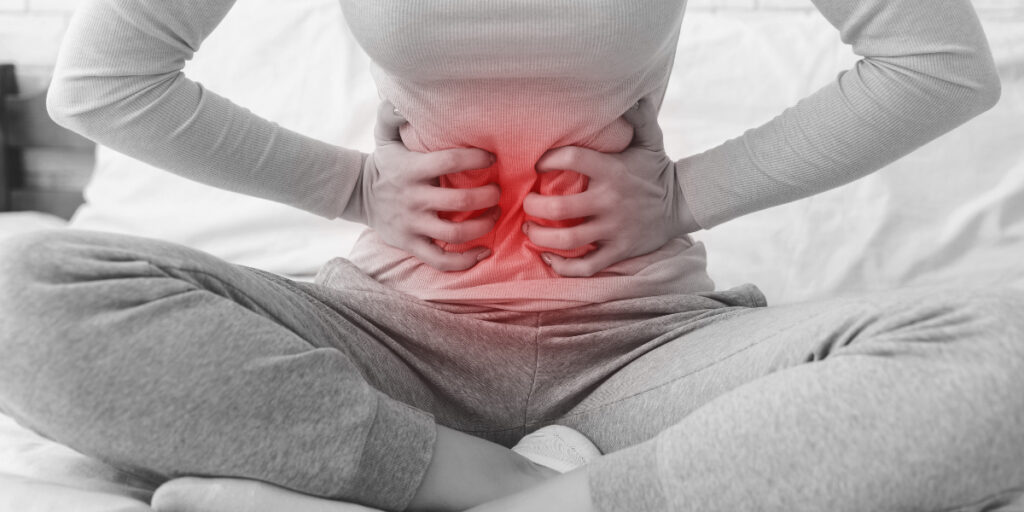
Bleeding is par for the course with periods, but how much is too much? Heavy periods can severely impact a woman’s quality of life and potentially lead to other, more serious health issues.
If your periods last longer than 7 days or you have to change your pad or tampon every hour for more than a day, you likely have heavy periods.1 Other signs include extremely painful menstrual cramps, passing clots the same size or larger than a quarter, or getting up to change your tampon or pad in the middle of the night. When periods are this heavy, it may be classified as a condition called “menorrhagia” or “heavy menstrual bleeding.”
Heavy periods have many causes, and they can be sorted into three general categories:2
Although heavy periods themselves are not dangerous, they can increase your risk of developing other health issues.
When you lose too much blood from your period, you may develop a condition called iron-deficiency anemia, where your body doesn’t have enough iron to replenish the molecule hemoglobin. Your red blood cells, the main component of your blood, need hemoglobin to help carry oxygen to your organs. When your body doesn’t get enough oxygen, you feel tired, weak, and cold.
Left untreated, anemia can bring about a host of potentially harmful conditions — namely, heart and lung complications. The most common heart issues associated with anemia are an unusually fast heartbeat (tachycardia) and heart failure, when your heart can’t pump enough blood at the right pressure.3 Additional side effects of anemia can include headaches, pale or yellowish skin, restless leg syndrome, and worsening of chronic conditions.4
Because significant blood loss can create serious problems for your long-term health, it’s crucial to see your OBGYN as soon as possible to prevent any serious damage resulting from anemia.
If medical therapies fail to relieve your symptoms, your doctor may recommend a surgical procedure. Rather than a major, invasive surgery like a hysterectomy, an endometrial ablation provides relief from heavy periods with faster recovery times and fewer long-term complications.5 This procedure is highly effective for women with heavy periods because it destroys the tissue that lines your uterus — where menstrual blood flows from.
The Cerene Cryotherapy Device is a novel, FDA-approved endometrial cryoablation technology that gynecologists use to destroy the uterine lining with freezing nitrous oxide, delivering a naturally pain-relieving effect for the nerves in the uterus.6 Cerene was designed with patient comfort and safety in mind, offering an in-office treatment that requires little to no anesthesia.
Cerene is clinically proven to considerably reduce the significant blood loss characteristic of heavy periods. In fact, 90% of patients reported normal, light, or no periods one year after treatment, and 86% also reported relief from severe cramps.†
If you think you have heavy periods, talk to your doctor to see if Cerene can help prevent the long-term complications associated with blood loss and iron-deficiency anemia.
Learn more at https://www.cerene.com/patients/.
† Improvement reported one year after treatment for patients reporting severe/very severe cramping before treatment
Cerene® Cryotherapy Device is indicated to ablate the endometrial lining of the uterus in premenopausal women with heavy menstrual bleeding due to benign causes for whom childbearing is complete. Pregnancy following the Cerene procedure can be dangerous; therefore, contraception must be used until menopause. The Cerene procedure is not for those who have or suspect uterine cancer; have an active genital, urinary or pelvic infection; or an IUD. There are risks and considerations associated with the use of the Cerene Cryotherapy Device. Temporary side effects may include uterine cramping, vaginal infection, and lightheadedness. For detailed benefit and risk information, consult the Cerene Instructions for Use (IFU) or your healthcare professional. Learn more >
Sources:
Important Safety Information
Cerene® Cryotherapy Device is indicated to ablate the endometrial lining of the uterus in premenopausal women with heavy menstrual bleeding due to benign causes for whom childbearing is complete. Pregnancy following the Cerene procedure can be dangerous; therefore, contraception must be used until menopause. The Cerene procedure is not for those who have or suspect uterine cancer; have an active genital, urinary or pelvic infection; or an IUD. As with all surgical procedures, there are risks and considerations associated with the use of the Cerene Cryotherapy Device. Temporary side effects may include cramping, nausea, vomiting, vaginal discharge and spotting. For detailed benefit and risk information, consult the Cerene Instructions for use (IFU) or your healthcare professional. Learn More
